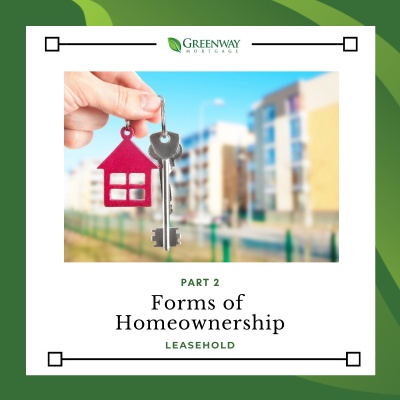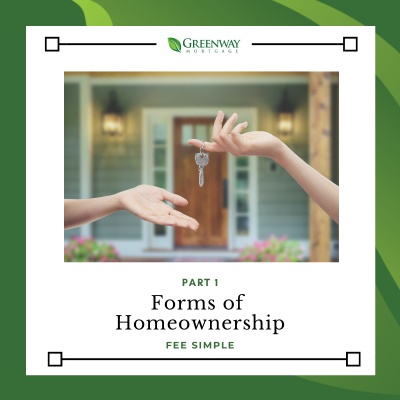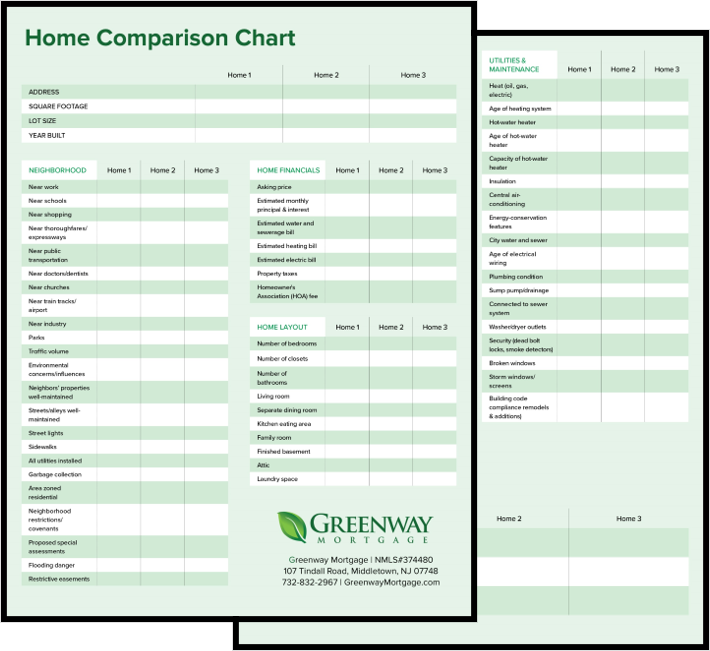
Welcome back to our four-part blog series on the different forms of homeownership. In Part 1, we learned about Fee Simple. In case you missed it, click here to learn more. This week, let's dive into Leasehold Ownership.
-
Landscaping
-
Painting the house
-
Installing a pool
-
Expanding the property by adding additional rooms (if city approves)

Fee Simple: Condos & Townhouses
Fee simple can be contrasted with condo ownership. What does this mean? An owner will have complete access to the land, but they don’t own it. Owners of single-family residences have fee simple ownership, but condo and most townhouse owners do not since they only own the individual unit and not the land. However, they obtain the right to use the community property.
Each unit has its own tax bill, deed, mortgage, and ownership rights, but shares in the maintenance of the common areas. A condo or townhome development will list the type of ownership available in the Covenants, Conditions and Restrictions (CC&Rs) document.

It’s no secret that buying a home can be a complicated and confusing process. In fact, surveys over the years have shown just how stressful Americans say the process is. We’re here to say, you’re not alone!
In fact, many Americans, about 40%, say buying a new home is the most stressful event in modern life, according to a survey of 2,000 Americans by Homes.com. Another 44% said they felt nervous throughout the home-buying process.
Think of it like this, buying a home isn’t a single action, but rather a series of small steps that eventually lead you the dream to homeownership. Each step in the process has its own challenges. That’s why our number one goal is to make the mortgage process a breeze for our first-time homebuyers AND for our seasoned homeowners.
If you’re currently in the process of buying your first house, keep reading! We’ve got some major tips to help keep your stress at bay!
Some common questions you may have early on in the process are the following:
- At what point do I need to secure my pre-approval letter?
- Should I shop around for mortgage rates first?
- How much documentation would I need to provide before a lender would pre-approve me for a mortgage?
While the mortgage process may seem daunting at first, you’ll come to realize that with Greenway by your side every step of the way that it is actually quite simple!
Step #1: Get Pre-Approved!
If you’re thinking about house hunting, the first step you should take is getting pre-approved. In order to make an offer on a house, your real estate agent will want you to have a pre-approval letter in hand.
Why? A pre-approval letter is a statement from the lender that you qualify for a specific mortgage amount based on an underwriter's review of all of your financing information (credit report, pay stubs, bank statement, assets, salary, etc). Getting an upfront loan approval will help you beat out the competition, negotiate with power and let you know how much you can afford.
What is Pre-Qualification?
Getting pre-qualified is important if you are just looking around, thinking about buying a house. Home loan pre-qualification helps you get a better idea of what size and type of mortgage you might qualify for in advance of submitting your actual mortgage application. With this information in hand, you can better plan and prepare financially for meeting your home ownership goals.
Tip: If you’re serious about buying a home, we highly recommend getting yourself-pre-approved to avoid losing out on the home of your dreams.
Getting Pre-Approved During COVID-19
Over the past few months, sellers and listing agents have been extremely cautious about who is coming into their homes due to the COVID-19 outbreak.
Having that pre-approval letter is key during this time, especially because agents and sellers want to come in contact with as few people as possible. A pre-approval letter will show them that you’re taking the process seriously. In fact, it may be your ticket into the homes you want to tour! So, what are you waiting for? Click here to get your pre-approval letter today.
The Good News About Getting Pre-Approved
The good news is, our online pre-approval application doesn’t take long. You’ll want to get yourself prepared with the necessary documents before you start. All of this and more will be needed once your loan is in process, so you may as well put it together now!
- Pay stubs – last 30 days
- W2s – last 2 years
- Federal tax returns – last 2 years, all pages and schedules
- Bank statements – Last 2 months, all pages
- Realtor and attorney contact info
- Copy of photo ID – must be legible
Trust us, having this letter in hand will save you so much time and stress! And you won’t have to worry about someone else making on offer on the home you had your eye on.
Mortgage Rates
If you’re in the market for a new home, this summer might be a good time to buy! Rates are low. How low? Contact your Greenway Loan Officer to discuss your financing options and to see what type of rate you could get.
Tip: Lower rates translate to lower monthly payments. That means you may be able to purchase more home for the same monthly payment or have a lower payment for the home you’ve always wanted.
As always, Greenway is here to help when you’re ready. Give us a call [908-489-4658] or visit us online to learn more.
Other Helpful Resources:

Download Your Free Home Comparison Chart Here.
Purchasing a home is a major milestone that tops many people's lifetime to-do lists—and maybe their list of financial fears too. But it certainly doesn't have to be a scary or stressful experience. With time, care, and research, you can take control of the home-buying process.
When looking for a home to buy, it becomes easy to get individual houses confused with one another because there are so many details. 
That's why Greenway Mortgage has created a Home Comparison Chart to help keep everything in order!
Our handy checklist identifies important factors to consider when choosing a home. In addition to an affordable sales price, you will also want to be sure that the neighborhood and house meets your needs.
Download and take this checklist along with you when you are house hunting. It will help you to evaluate the neighborhoods and assess the availability and condition of various features of up to three homes in a side-by-side comparison.
Planning ahead for your mortgage application will save you time and trouble once you start making offers. Here's a list of things you'll need to gather!
Income
- Provide your last two paystubs along with your W2s and Federal tax returns for the last two years (include all schedules). State returns are not needed.
- If you are self-employed, ask me for the additional documentation requirements.
- If you receive bonus or commissions or have changed your job or position, let’s talk.
Assets
- Combine all the funds needed to close into one account at least two months prior to your application.
- Document any other deposits here as each could be scrutinized.
Your Statements
- Save all pages of your asset statements, even if some are blank or are just advertisements.
Deposits
- Deposit checks individually.
- Don’t deposit cash without clear proof of the source.
Liquidation
- If you are going to sell stocks, bonds, investments or borrow against a retirement account, do it now. Cashing out now may cost you a few dollars in additional gains, but it also protects against losses.
Current Housing
- If you own and are selling, provide a copy of the HUD-1 settlement statement.
- If you own and are not selling, you'll need to qualify for both homes or meet the requirements for renting the current.
- If you are renting, show 12 months of canceled checks demonstrating timely payments and/or written verification from your management company. Ideally, pay your rent on the same day each month on or prior to its due date.
- If you live with family, you may need a letter stating that you live rent-free.
Credit
- Check your credit report at www.annualcreditreport.com. Identify any errors now and consult with us for the correct action to take.
- If you co-signed a loan or are being reimbursed for a loan that’s in your name, you’ll need at least six months of checks to exclude it.
- Avoid new credit or inquiries. These can lower your score and increase your rate.
Employment Stability
- Ideally, you’ll have two years or more with your current employer.
- Consult with us before changing employers, position or method of compensation. For example, don't switch from salary to commissions.
Have questions? Reach out to the Greenway Mortgage Team! We are here to help. And if you're ready to get started - click here to apply online! Start closing your loan in about 15 minutes with our easy online application!


.png)





.jpg)
